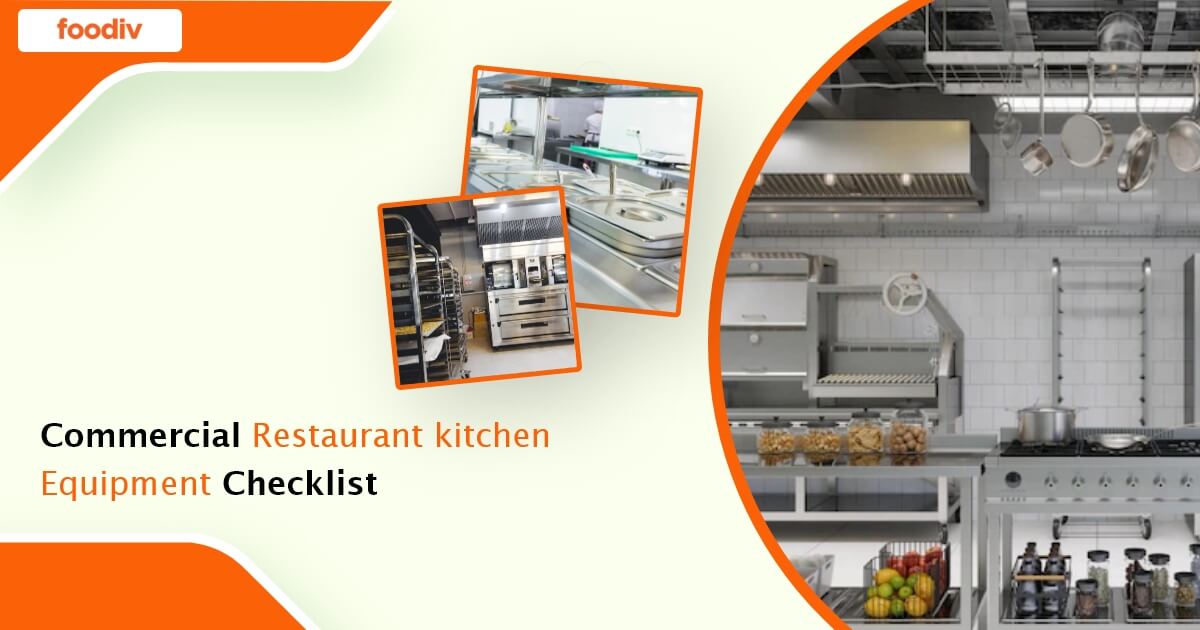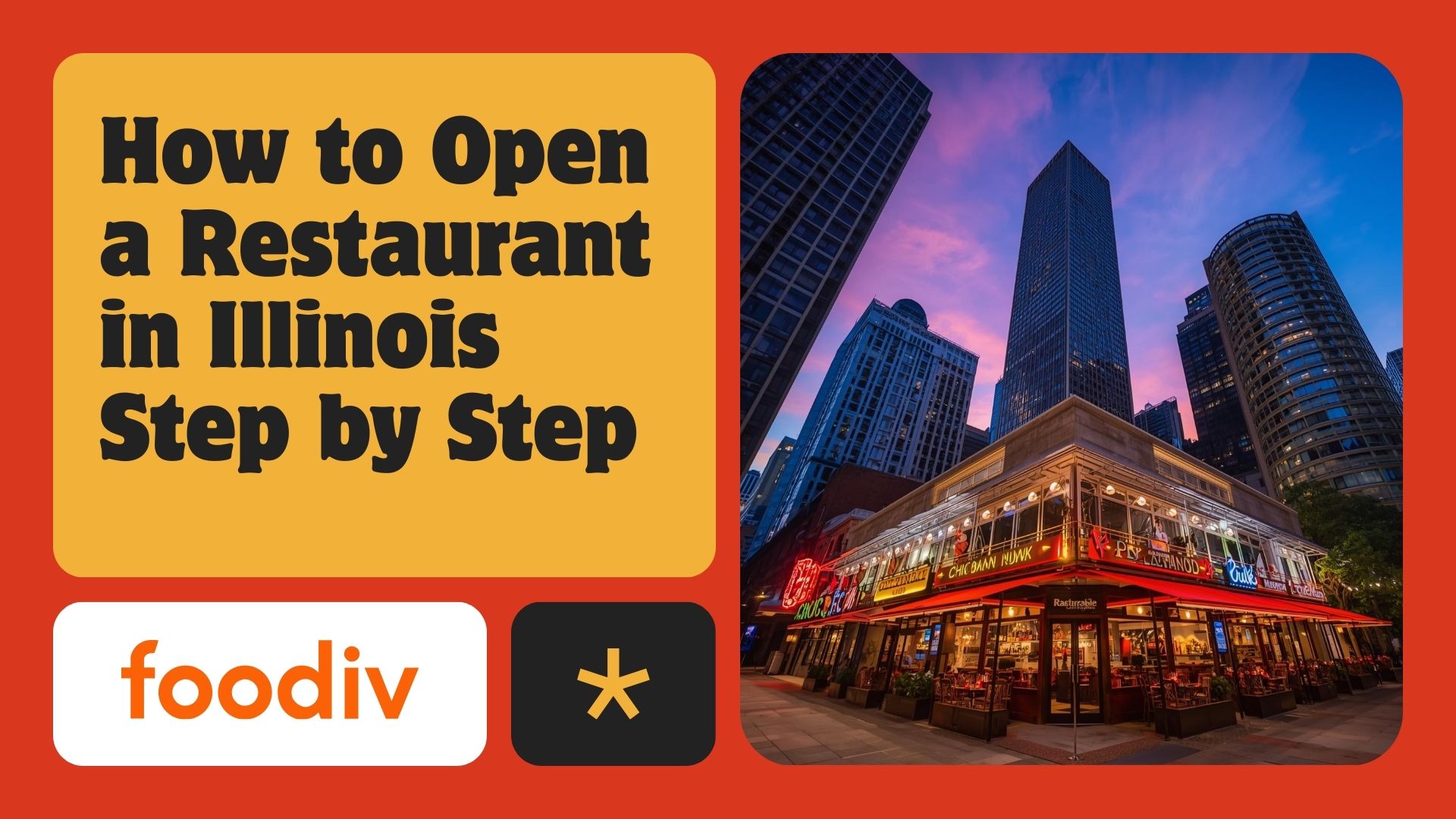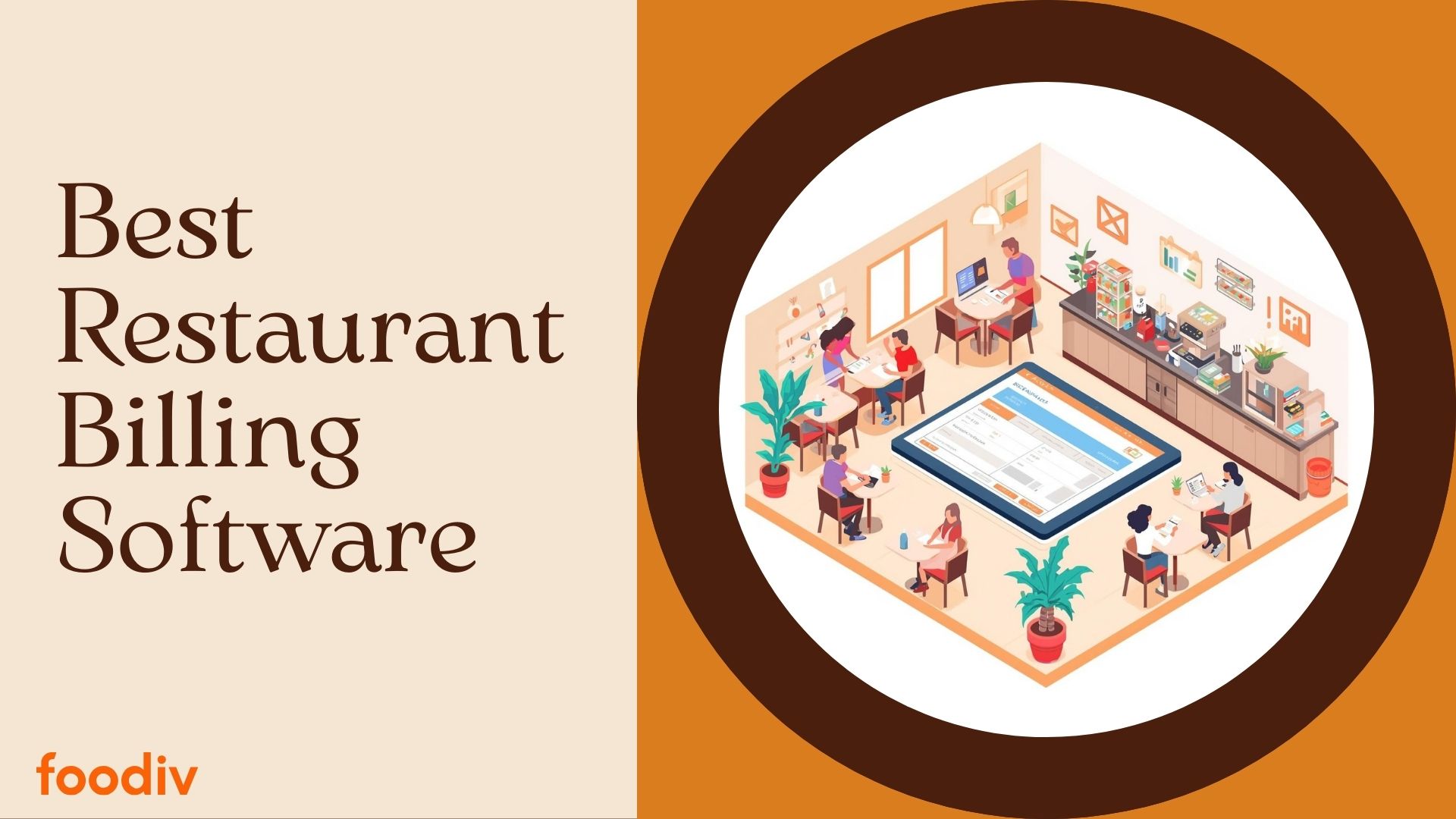
Quick Summary: Are you starting a restaurant? We understand you have plenty of jobs to do, though we would like to draw your attention to the most important thing —the kitchen equipment list for your restaurant. They seem least important, though they are very crucial that you must explore even before creating your restaurant business plan.
Running a restaurant is challenging. You need to take each step carefully, right from choosing the right location and hiring the right staff to buying the right kitchen equipment for your restaurant or increasing restaurant sales. Why is buying the right kitchen equipment important? Buying the right equipment helps the kitchen staff do their job effectively and complete orders on time.
Depending on the size and type of the restaurant, buying commercial kitchen equipment can be a sizable investment. One small mistake could mean exceeding your budget or delaying in serving time, leading to unhappy customers and loss of reputation.
We are not trying to scare you here but it does not hurt to put a little thought into it while buying the right equipment and kitchen accessories for your restaurant. As per an FMI (Future Market Insights) report, kitchen equipment sales will rise at 5.3% CAGR between 2022 to 2029.
Apart from the increasing demand for kitchen equipment, inflation will also play a prominent role in their prices. Bearing these factors in mind, you should be careful while choosing kitchen equipment for your restaurant. In this blog, we will share tips on how to accomplish this mission.
11 Tips to Helping You Choose the Right Restaurant Kitchen Equipment
Having the right kitchen equipment is as important as opening a restaurant itself. In fact, you will get a comprehensive guide for opening a restaurant just by visiting blogs and articles, but for restaurant kitchen equipment, you must consult the kitchen staff. After all, they will be using it daily. It is also advisable to talk to an experienced restaurateur as he can provide you with valuable advice. Let us go into the details.
Determine What you Need
There is no point in buying fancy stuff that you will not use. There are various factors that will influence your decision to buy kitchen equipment for your restaurant. Ask yourself the following questions?
- How many customers will you serve?
- What kind of cuisine do you serve?
- Is it a takeaway, fine dining or casual restaurant?
- How many employees will you hire?
- Will you invest in branded or generic equipment?
- What kind of kitchen equipment do your competitors use?
- What is your restaurant/hotel’s menu?
The above questions are just examples. Apart from your target audience, you also need to buy appropriate equipment if you cater to a particular ethnic group. For example, Asian restaurants might need unique bowls, chopsticks and spoons. Also, know your menu and buy equipment accordingly. If you own a quick service restaurant, you need a serving counter.
It’s not just the kitchen accessories and supplies, think about the order-taking aspect. Do you think you might need an LED menu board? Prepare a list of kitchen equipment for your restaurant before buying stuff. There is no shame in buying used kitchen equipment if you are on a budget. Moreover, if the used kitchen equipment is in good condition, you should consider purchasing them.
Expenses, Budget and ROI
It is common knowledge that restaurants and food joints will take between 1-3 years to arrive at the break even point. Hypothetically speaking, if you invest $80,000 in kitchen equipment at the start, how much time will it take for you to recover the cost? Don’t buy things you think might be useful? Will they be useful? Take a moment and analyze carefully.
Effective Use of Space
How big is your restaurant? Bear in mind the space available before buying restaurant equipment. If the equipment and accessories are too big, they might get in the way of the kitchen staff. Apart from creating an unsafe working space, clunky and inappropriate equipment can also reduce productivity. Rather than investing in a huge oven that sits by the site, choose a wall oven. Also pick appliances that perform multiple functions like grinding, blending, chopping to save money.
Quality over Quantity/Price
Invest in high-quality, durable equipment that will last for years. Flashy and latest equipment may look attractive but if you have to buy them every two years, they are useless. You do not necessarily have to invest in kitchen equipment used at 5-star hotels, but durable, long-lasting ones will do. Even if you buy used equipment, ensure that they are in good condition. Consider the below factors before buying used restaurant equipment.
- How old is the equipment?
- Who used it before?
- What is the present condition?
- Do you have the billing, warranty and other related documents?
- Is this kitchen equipment and accessories easily repairable?
If appliances and kitchen equipment are covered under warranty, you do not have to incur unwanted expenditure. If the equipment is easily repairable, you can have them repaired if they stop working. At the same time, do not buy equipment only because it is cheap. Getting lucrative deals is great but not at the cost of quality.
Safety Standards
Every country has safety standards and all establishments must adhere to them. Failure to do so might result in heavy penalties and lawsuits.Before buying any equipment, check if it is outdated, old, unsafe or unethical. Consult a legal expert and research the food safety rules and regulations in your jurisdiction before taking the plunge.
User-Friendliness and Convenience
You may have the latest and trendiest commercial kitchen equipment at your establishment, but it is futile if they do not deliver the desired results. All equipment and appliances must be easy to use and clean. Try out different products, talk to the company’s representatives and have the kitchen staff use them.
Address your staff’s concerns related to the product and its usability. Pay attention to the product’s features along with cleaning and storage options. Does the equipment require an annual, monthly or weekly maintenance plan? What is the make of these products? Is the equipment made of safe metal, will it react with food? Is the plastic of food-grade quality? There are thousands of questions you need to ask yourself before buying kitchen equipment. Tread carefully.
Find the Right Supplier
You have compiled a detailed list of kitchen equipment for your restaurant but the battle is not over it. Now, it is time to find a reliable supplier who can provide you with the required equipment at the right price. Prepare a list of noteworthy suppliers in your area and ask for quotes. Compare each quote and see which is the best one for your establishment.
The ideal supplier will not only give you a good deal but also recommend the best equipment for your business. Heed to their advice because an experienced supplier is aware of the latest trends and the demands of the food & beverage industry. Do not forget to inquire about policies related to repair, insurance, warranty, maintenance and installation.
Consult a Restaurant Kitchen Planner
Are you new to the restaurant industry? If you have a reasonable budget, it would be wise to hire a kitchen planner. A kitchen planner might seem like an unnecessary expense in the initial stage but they can advise you on space management, buying the right equipment, and slashing unnecessary expenses.
Buying a huge grinder or chiller without understanding the requirements can prove disastrous. Apart from unwanted expenses, you won’t be able to get a good resale price because nobody buys them frequently.
Warranty Period
Check the warranty period for each appliance/equipment before purchasing. It is no use repenting later, so it is good to confirm these aspects beforehand. Confirm with your supplier if he is on good terms with the manufacturer. In the future, these details will come in handy when you need to service/repair or claim warranty for faulty restaurant equipment. Do not rely on physical records. Save the warranty details for each appliance/equipment on your computer. You can refer to them whenever necessary.
Environmental Friendly Features
Technological advancements have brought in many appliances that can boost productivity and reduce human labor. However, some equipment may release harmful chemicals, carbon-dioxide or consume massive amounts of water. Go through your restaurant’s kitchen equipment list and identify appliances that may be harmful to the environment. Complying with your country’s laws and thinking about the environment sends out a strong message to your customers. Additionally, it can also help you save money on utility bills.
Always Insist on a Demo
Before you buy any kitchen equipment for your restaurant, it is vital that your employees learn how to use the product. The company’s representative must be present to explain the product features and how the staff can get the best out of it. A test run will ensure that you don’t get any nasty surprises post-installation. Ask the manufacturer about the party responsible for the installation. Will it be them or the seller? Once the representative demonstrates all the features, the departmental head, business owner and staff can decide the further course of action.
Must Read: Low Budget Small Cafe Interior Design Ideas
Checklist for Commercial Equipment You Need for Your Restaurant
Are you starting a restaurant? You have plenty of things to explore and accumulate. However, knowing the restaurant kitchen equipment requirement is the first thing to explore. As you are starting a restaurant or Cloud Kitchen Business , you may wonder what equipment you need to start your business. So, we have jotted down a restaurant commercial equipment list for you. Let’s explore;
#1: Oven
One of the essential appliances in your kitchen arsenal is the oven. The kind of oven you’ll want will mostly rely on the sort of restaurant you’re opening and the food you’ll be serving. For example, you might require a different kind of oven for your bakery than your fine-dining establishment.
Knowing what to look for is crucial because selecting an oven can be cumbersome. When choosing the ideal range for your restaurant, keep the following things in mind:
Size of the oven: Know what size will fit your restaurant business requirement.
Quality of the oven: Ensure the oven quality is pure and of a high standard. Durability is what you need for long-lasting performance.
Types of the oven and what you need: There are various types of the oven, include;
- Commercial oven
- Convection oven
- Combination oven
- Pizza oven
- Conveyor Oven and more
#2: Ranges and Ventilation
After you’ve figured out the ovens, you should start considering your ranges and ventilation. Ranges are a crucial part of your kitchen equipment for your restaurant, and ventilation ensures that the airflow is comfortable for your kitchen staff.
Considering the ranges, you have two options, they include;
- Gas ranges
- Electric ranges
Ventilation: Ventilation ensures better airflow and maintains the temperature throughout your kitchen. But to have better quality ventilation, you need to provide the following things;
- Better air volume flow rates for enhanced ventilation
- Static pressure for balanced friction against the air
- Proper energy efficiency for the right balance of airflow with the fan’s horsepower
#3: Charbroilers
When it comes to having a charbroiler, it is the most common equipment used in commercial restaurants and gives meats, seafood, and vegetables a fantastic smoky flavor as well as tasty sear marks. Charbroilers come in a range of sizes in both gas and electric (infrared heat) types. The features include cutting boards, over shelves, splash guards, condiment rails, plate rails, and various grate designs. Additionally, countertop charbroilers are convenient space-savers for many establishments.
#4: Food processors
Dicing, slicing, shredding, grinding, and pureeing are just a few of the food preparation methods used in a food processor or a kitchen appliance. There are many different types of food processors; however, for your restaurant, you should consider the following quality based on your requirements.
A batch bowl processor is widely popular and can be a better option for commercial kitchens.
A continuous-feed food processor is the best choice for heavy-duty food processing requirements.
Buffalo choppers are required when you want to achieve heavy-duty work, such as processing meat, fish, and other food products.
#5: Microwave
A microwave is one of the few products on every kitchen equipment list that will make your kitchen operation easier. In a restaurant kitchen, this is one of the most often utilized equipment for last touches or single servings. You can quickly reheat prepared foods in a microwave.
Ensure you have branded microwave for better durability
The size of the microwave should fit into commercial requirements
#6: Mixers
A commercial mixer will likely be required in restaurant kitchens that provide baked goods like slices of bread, cakes, or pizzas. Commercial mixers are made to handle heavier loads of ingredients and more regular use.
#7: Freezers and refrigerators
A refrigeration system of some kind is necessary for every commercial kitchen. You can only keep ingredients and prepared foods fresh with a refrigerator. Additionally essential for inventory control are freezers. For example, purchasing 300 steaks and freezing them is far more cost-effective than purchasing ten steaks every day.
#8: Safety equipment
Make sure the appropriate safety equipment is in your kitchen. In a job where fire and knives rule, having an adequately filled first aid bag or medical emergency pack is essential. Other items you’ll need are fire extinguishers and domed safety mirrors that alert people when someone is approaching a corner. Before acquiring any fire, safety, or sanitary equipment, check your local fire department’s policies. You may also minimize any problems by constantly maintaining your kitchen up to fire code requirements.
#9: Shelving Units and Storage Racks
A fantastic way to store various kitchen gadgets, as well as perishable and nonperishable items, is with a properly fitted shelf. Your operation will run more smoothly if your storage system is organized. Keep the kitchen utensils that are used the most easily accessible, and place the utensils that are used less frequently on the top and bottom shelves. Just make sure the lowest shelf is at least six inches off the ground to meet code requirements.
#10: Slicers
You should buy an electric slicer to save your team time if you’re producing charcuterie boards like there’s no tomorrow. However, if you only sometimes slice food (for example, to add fruit to desserts), a manual slicer will do the trick for less money.
With this list, we have provided you with the basic commercial equipment that you need to start your restaurant. There are some other food equipments that you might need will include;
- Batch bowl processors
- Food prep counters and cutting boards
- Restaurant kitchen supplies
- Servingware
- Storage containers
- Sinks
- Compartment sinks
- Bar sinks
- Disposal sinks
- Drop-in units
- Handwashing sinks
- Mop sinks
- Portable sinks
- Kitchen Display System (KDS)
- Restaurant POS (Point of Sale) system
- Steam tables
- Washing equipment
- Microwave
- Ice makers
- Electric Grill
You may not need all of the above, but you may need many of them. Which one of them do you need? It all depends on your business type, customers, long-term goals, and other factors. We know that choosing the right kitchen equipment is not easy, but it’s not rocket science either. You can make it happen with a little presence of mind, logical thinking, and professional advice. Best of luck.
Also Read: How to Start a Food Delivery Business
Final Thoughts
Whether it is restaurant or hotel kitchen equipment, you need to think about all aspects. Preparing a list of kitchen equipment for your restaurant is not enough. Consider your budget, target customers, business objectives, and other factors before pumping your money into the equipment. Starting a new business or renovating it are crucial financial decisions. One mistake could ruin everything. Although there is no cookie-cutter approach for food establishments, most restaurants, hotels, and food businesses may need the below equipment.











